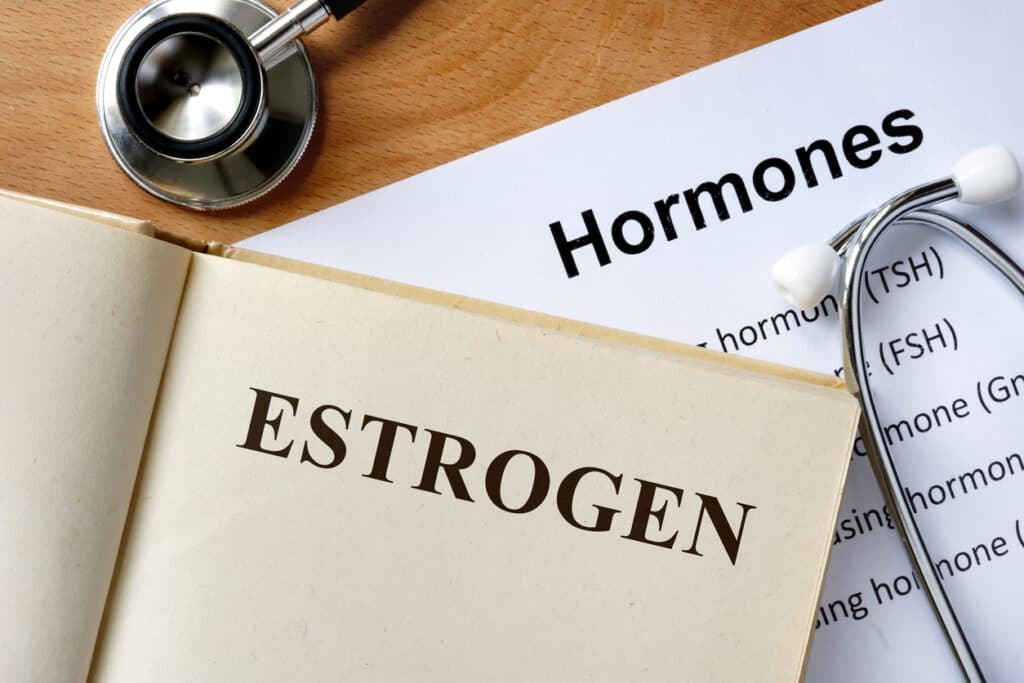As we age, low estrogen in women can cause some very annoying symptoms.
Are you a woman in your late thirties or early forties and noticing some unusual changes in your body?
If so, then it’s very likely that you may be experiencing signs of low estrogen. Low estrogen in women can occur as a result of a variety of causes, including peri-menopause and menopause, and can cause a wide range of physical and emotional symptoms.
In this blog post, we’ll be discussing the top 5 signs of low estrogen in women and what you can do about it.
Read on to learn more about how to identify the signs of low estrogen and how to treat it!

The following are the top 5 signs of low estrogen levels:
1. Irregular periods: Estrogen helps regulate the menstrual cycle, and a decrease in estrogen levels can cause irregular periods.
2. Vaginal dryness: Estrogen plays a vital role in maintaining vaginal health and lubrication. A decrease in estrogen levels can lead to vaginal dryness, itching, and discomfort.
3. Hot flashes: Hot flashes are a common symptom of menopause, and they can be caused by low estrogen levels.
4. Night sweats: Night sweats are a common symptom of menopause and can be caused by low estrogen levels.
5. Mood changes: Estrogen can impact serotonin levels, a hormone that regulates mood. A decrease in estrogen levels can lead to mood changes, including depression, anxiety, and irritability.
How to Balance Estrogen Levels

Here are some ways to help balance estrogen levels during perimenopause:
1. Eat a balanced diet: A balanced diet rich in vegetables, fresh fruit, legumes, whole grains, and healthy proteins and fats can help regulate estrogen levels. In particular, fiber-rich foods can bind to estrogen, which helps balance levels (even if your estrogen is low, this is a good thing).
2. Exercise regularly: Regular exercise can help regulate estrogen levels by reducing stress, increasing metabolism, and helping to maintain a healthy weight.
3. Manage stress: Stress is a very common cause of hormonal imbalances, so finding ways to manage stress, such as through meditation, yoga, walks in nature, or even volunteering can be beneficial.
4. Get enough sleep: Getting enough sleep is absolutely essential for hormonal balance. Aim for seven to eight hours of sleep each night.
5. Limit alcohol consumption: Excessive alcohol consumption can disrupt hormonal balance, so it is important to limit alcohol consumption.
6. Quit smoking: Smoking can also disrupt hormonal balance, so quitting smoking can be beneficial.
7. Use natural remedies: Some natural remedies, such as black cohosh and red clover, have been shown to help balance estrogen levels in some women. However, it is important to discuss the use of these remedies with a healthcare provider before trying them.

8. Consider hormone replacement therapy: Hormone replacement therapy (HRT) can be used to supplement estrogen levels in the body. However, it is important to discuss the risks and benefits with a healthcare provider. Our “Sail Through Peri-Menopause” program can help you decide if HRT is right for you.
9. Consider progesterone levels as well. Often, women experience signs of estrogen imbalance because their progesterone is low. Again, talk to your healthcare provider about testing for hormone levels.
It is important to note that every woman’s body is different, and what works for one may not work for another.
Our “Sail Through Peri-Menopause” program can help you with all of these strategies in depth. That is why we created it! We don’t want any woman to suffer needlessly.
If you are looking for ways to balance your estrogen and other sex hormones, we can help!
